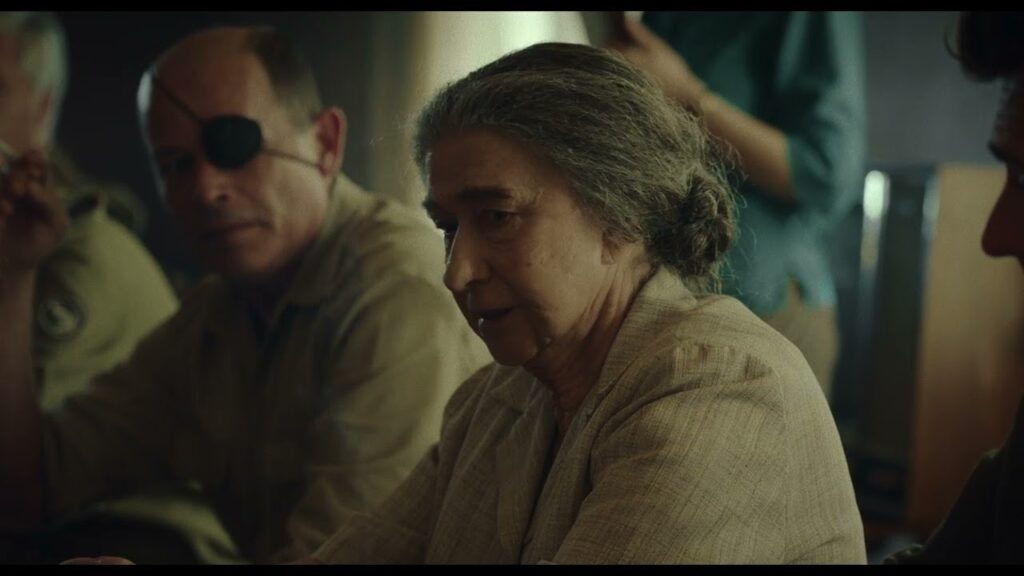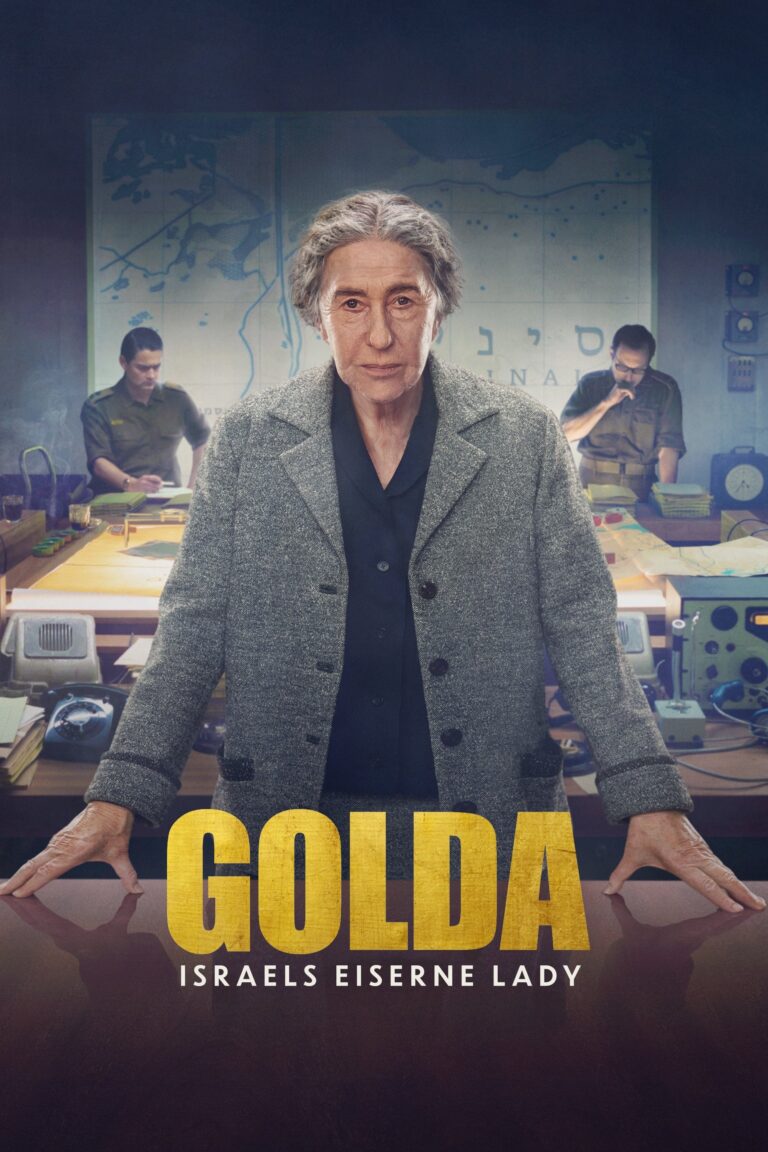Golda – Snapshot
Golda is another movie with a some strong points, but fails to find a strong story to tell. The makeup and some of Helen Mirren’s scenes form the kernel of a great movie. Unfortunately, the script and direction never get hot enough to let it pop. (2*)
Where to Watch:
Stream: Paramount+
Rent: Apple/Prime/Fandango ($4)
Golda – The Oscar Buzz
Oscar Nominations (1) / Oscar Wins (0) :
Makeup & Hairstyling (Harley/Battersby/Kelly-Blue)
Golda received a single, deserved, nomination for Makeup & Hairstyling. If you didn’t know in advance, I think you’d be hard pressed to identify Helen Mirren as the actress playing Israel’s Iron Lady, Golda Meir. The skin prosthetics, from the nose to the eyes and including all the lines, are remarkably accurate. Mirren sat in a chair for three and a half hours every day during shooting to change her appearance into what is amazingly close to the newsreel pictures of Meir during the early 70s. There are several scenes where the camera is clearly “in her face” and it simply isn’t possible to see where the prosthetics end and Mirren’s real skin begins. The work on her hair, even if it was a wig, accurately portrays the coarse texture and weathered colors of a woman in her seventies. It is a remarkable job. (Work done on Liev Schreiber, playing Henry Kissinger, was good, but not like Mirren’s). Karen Harley, Suzy Battersby, and Ashra Kelly-Blue have a well-earned first nomination under their belts.
Golda was directed by Israeli film-maker Guy Nattiv who, as a fairly young man, has only done three other feature-length films, none of which I am aware of. Most of his work is on live-action shorts and he won the Oscar in that category for his short Skin. The only other Oscar connections I could find were in the Sound department, which makes some sense given that we participate in the battle scenes mostly via radio transmissions. One of the sound mixers was Oscar-nominated for his work in Belfast and again for Gravity.
Helen Mirren, of course, is no stranger to the Oscars having won the Leading Actress Oscar for The Queen. She was also nominated for her classic very British performances in Gosford Park and The Last Station.
Golda – Related Movies
Direct Ancestors:
(None)
Other Guy Nattiv Films:
Skin (18)
Other Influences
The Last Station (09)/The Queen (06)/Gosford Park (01)/Barbie (23) (Mirren)
Florence Foster Jenkins (16) (Script)
Foxtrot (17) (Editor/Production Design)
Nimona (23)/Mission Impossible: Dead Reckoning (23)/Napoleon (23)/Top Gun: Maverick/Belfast (21)/House of Gucci (21) (Sound)
Director Guy Nattiv, a relatively young Israeli filmmaker, hasn’t yet built a substantial filmography, which means he doesn’t have a consistent team of crew members. Most of the crew members and several actors have more experience in television than in cinema. As I’ve mentioned before the two mediums demand different creative skills.
Golda – What Others Think
Golda appears to be a movie that both audiences and critics disliked. I use two measures of audience appeal and two to assess critical opinion and then usually take averages to come up with common measurements. For Golda, though, that approach yields an anomaly – three of the four rating measures place Golda at the very bottom of all 38 of this year’s movies, while the fourth one, a measure of audience appeal primarily at the box office, ranks the movie eighth and tied with this year’s best picture winner, Oppenheimer! Quite possibly, the subject matter, a prominent Israeli, has provoked a large negative, but political, reaction to the online measures, while those who paid to see the film in a theater generally found the movie rewarding. Even among those who have seen the movie, I found comments like “Less is less”, “…there are problems”, “expected more”, and “Disappointingly dry”.
The professional critics consistently rated Golda at the bottom of all 38 nominated movies, and by quite a bit – the average rating is a 51 and the next lowest is Napoleon ten points higher! Critics seemed to find that the heavy weight of the makeup gave Mirren’s Meir “a stoicism that makes her an elusive figure,” according to Christy Lemire (RogerEbert). Lemire also noted that the narrative too often seems to flow using “dry, repetitive strategy meetings between Meir and her top military advisers.” Britain James Berardinelli (ReelViews) felt that “too much of the movie feels like a rote dramatization of the Wikipedia entry…- mostly accurate but lacking in immediacy and dramatic power.” He concludes “as theatrical experiences go, this one underwhelms.”
Generally speaking, viewers and critics both applauded Helen Mirren’s performance and the makeup transformation as Golda Meir, but found the portrayal of events to be lacking real human interest. As mentioned, this movie falls at the bottom of all the movies, tied with – a movie I liked – Maestro!
Golda – Special Mention
The Yom Kippur War – Israel and its Arab neighbors have been at war for decades, despite cultural roots dating back thousands of years. Israel, a modern nation-state created in 1948, was partly a meager compensation for the Jewish people’s suffering under Hitler in World War II. This led to the uprooting and displacement of many Palestinian Arabs, who have yet to fully adjust to this situation. National interests and Big Power Politics between the U.S., European Union, Soviet Union/Russia, and China have further complicated the issue.
No one considers the conflict fully settled, leading to numerous wars over the past 80 years to define political, social, and cultural boundaries. The Six-Day War in 1967 demonstrated Israel’s military capability with U.S. support, resulting in the occupation of the Sinai Peninsula from Egypt and the Golan Heights from Syria. This led to the Fourth Arab-Israeli War, the Yom Kippur War, portrayed in the Golda movie. The war lasted three times as long as the previous one, regaining credibility for the Arab side, especially Sadat in Egypt and Assad in Syria. This led to the 1978 Camp David Accords, negotiated under Jimmy Carter, which returned the Sinai to Egypt and resulted in Egyptian recognition of the Israeli state.
Golda Meir – Meir, Israel’s fourth Prime Minister and the first female leader, oversaw the Yom Kippur War as depicted in the film. Surprised by the hostilities, she was replaced as Prime Minister in 1974 by Yitzhak Rabin.
Born in Kyiv, Russia in 1898, Meir’s family immigrated to the U.S. She became a teacher and embraced the Labor Zionist movement. In 1921, she and her husband moved to Mandatory Palestine, where she served as Labor Minister and Foreign Minister under David Ben-Gurion. Ill health forced her retirement in 1966, but she returned as Prime Minister in 1969.
A chain smoker, Meir’s health problems likely contributed to her death from lymphoma in 1978 at the age of 80.
Golda – Michael’s Moments
There are several good things about Golda, the movie. As the Oscar nomination and multiple critics have pointed out, the cosmetic work to make Helen Mirren look almost exactly like Golda Meir is strikingly effective – she looks just like the newsreel shots. And Mirren’s performance, itself – given the lines and the actions she is charged with executing – perfectly exudes the “Iron Lady of Israel”. Golda/Mirren is at her best when she actually has to exhibit some real emotion. Whenever she is engaging with Henry Kissinger (Liev Schreiber), she shows wit, intelligence, and a kind of implicit understanding of the levers of power. At around the 43-minute mark, when she talks to Kissinger over the phone, and again, at 65 minutes, when Kissinger pays a personal visit to her home and she serves him borscht – these are the moments when the chemistry between the two extracts genuine emotion and understanding from the stoic Iron Lady. Additionally, the horror in Golda’s face when, listening to the battle developments over the radio in the war room (at about minute 35), reveals her acute awareness of the casualties caused by her counterattack. These, and there are a few others, are the real moments of emotion.
The question to ask about Golda, though, is what is the movie’s intended message? Possibly because the filmmaking team lacks real experience in making feature-length movies, Golda’s biggest problem is that the filmmakers don’t have a solid understanding of what they are trying to say. Sure, it has some great makeup and some terrific acting from Mirren and Schreiber. But what is the takeaway we are supposed to leave with? As an example of the film’s lack of direction, there are repeated references to a flock of starlings (at 16, 33, and near the end at 114 minutes), and they do some strange things. But there is no attempt to relate these bird scenes to the action of the movie – they remain just a curiosity. The war scenes, where people are dying, are not portrayed in real time but are heard through radio broadcasts and sound effects. How much more impact might there have been if we had a direct storyline involving Golda’s secretary’s son?
I don’t have budget numbers for Golda, but aside from the salaries for Mirren, Schreiber, and the prosthetics, the movie lacks any real investment. It is cheap all the way down the line, and it isn’t too surprising that it lands at the bottom of this year’s pile among critics and most audiences. I won’t go quite that far, but I just can’t recommend this movie. (2*)


